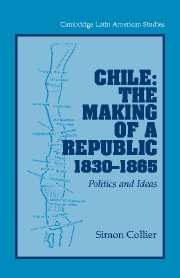Book contents
- Frontmatter
- Contents
- Acknowledgments
- Abbreviations Used in the Notes
- Introduction
- PART I THE NEW REPUBLIC, 1830–1865
- PART II FROM PORTALES TO MONTT, 1835–1851
- PART III MID-CENTURY ATTITUDES
- 5 Progress and Its Instruments
- 6 Political Argument
- 7 Model Republic
- 8 Looking Outward
- PART IV ORDER AND LIBERTY, 1851–1864
- Sources
- Index
5 - Progress and Its Instruments
Published online by Cambridge University Press: 24 July 2009
- Frontmatter
- Contents
- Acknowledgments
- Abbreviations Used in the Notes
- Introduction
- PART I THE NEW REPUBLIC, 1830–1865
- PART II FROM PORTALES TO MONTT, 1835–1851
- PART III MID-CENTURY ATTITUDES
- 5 Progress and Its Instruments
- 6 Political Argument
- 7 Model Republic
- 8 Looking Outward
- PART IV ORDER AND LIBERTY, 1851–1864
- Sources
- Index
Summary
The political struggles within Chile's governing class during the making of the republic seem, on the face of it, to have been clear enough – defeated (and reviving) Liberals at loggerheads with victorious Conservatives, the champions of liberty versus the upholders of order. In many respects, however, Conservatives and Liberals always laid claim to rather similar ideological terrain, despite their fierce struggles, and used a common language when attacking each other, as we have noted in the electoral propaganda of 1851. Certainly the great keywords of the period – “liberty,” “reform,” “democracy,” “progress,” “civilization,” and so on – were used with comparable frequency by the two sides, although the use made of them by Conservatives and Liberals was sometimes slightly different.
There were many ways in which disagreements did not run along party lines at all. This was especially true of the practical reforms and improvements both sides wished to see in the Chile of the period. All the evidence we have suggests that the political class as a whole rather clearly favored policies such as (to take the two outstanding cases) the promotion of education and the encouragement of European immigration. When there were differing approaches to the practical application of such policies, Conservatives and Liberals were always to be found on both sides of the argument. The solvent was the idea of progress.
- Type
- Chapter
- Information
- Chile: The Making of a Republic, 1830–1865Politics and Ideas, pp. 105 - 121Publisher: Cambridge University PressPrint publication year: 2003

